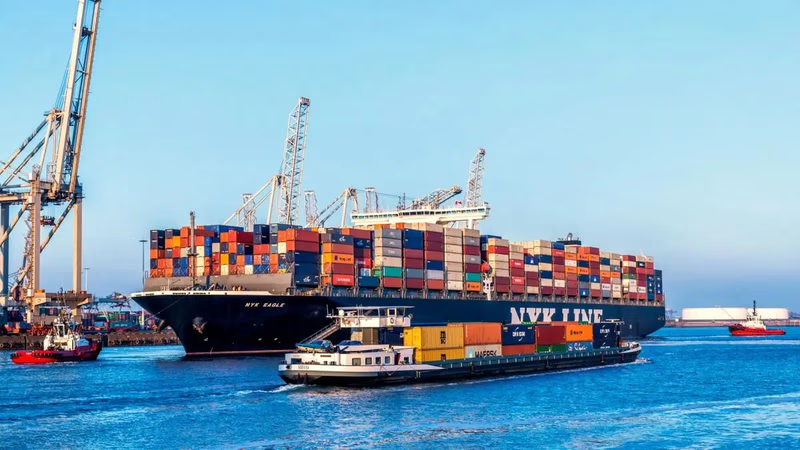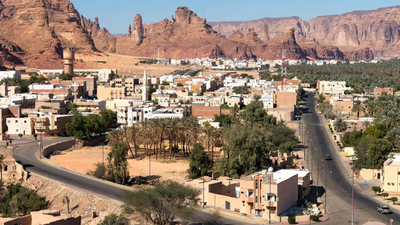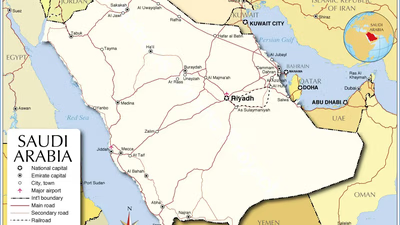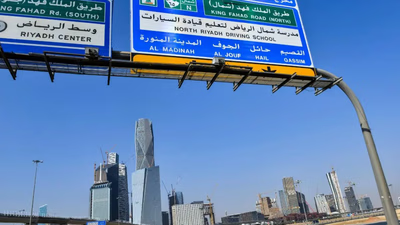
Cargo inspection process in Saudi Arabia"s trade platform. "
Saudi Arabia, like any country, has regulations and laws governing the import and export of goods. These regulations aim to ensure the safety, security, and compliance of cargo entering or leaving the country's borders. The enforcement of these regulations is typically carried out by customs authorities or relevant government agencies. Customs authorities in Saudi Arabia are responsible for inspecting and assessing incoming and outgoing cargo to ensure compliance with applicable laws and regulations. They have the authority to examine and verify the contents of shipments, check documentation, and enforce import and export restrictions or prohibitions.
If a consignment is found to be in violation, a security label is affixed to it. The shipping company, then warehouses of the cargo under its responsibility inform people, its owner can be present to receive it. All Saudi lines are responsible for keeping the cargo in storage. When the owner arrives, the consignment is handed over to him in the presence of the customs inspector - who is responsible for issuing the security label, or lead seal and then inspected and the process is completed.
If the owner of the infringing consignment does not come, the consignment will be transferred to a place announced by the carrier company. Then, for inspection, it is sent to the customs in the presence of the company's representative by its owner and then exported abroad. In case of detection of prohibited substances, or with special conditions, or subject to duties, customs laws and instructions shall apply to them.
The annual income of an American is more than twice the annual income of a Saudi. In 2017, the annual income of each American was $ 56,160. While the annual income of each Saudi was $ 20,090 in the same year, which is 9.2 times lower than the annual income rate in the United States. One of its Oil fields has enough Oil that can fill 77.4 million swimming pools for the Olympics.
The customs inspector places the consignment (passenger) on the inspection device and if a consignment is found to be in violation, a security label is affixed to it. The shipping company then warehouses the cargo under its responsibility so that its owner can be present to receive it. All Saudi lines are responsible for keeping the cargo in storage. When the owner arrives, the consignment is handed over to him in the presence of the customs inspector - who is responsible for issuing the security label, or lead seal - and then inspected and the process is completed.
If the owner of the infringing consignment does not come, the consignment will be transferred to a place announced by the carrier company. Then, for inspection, it is sent to the customs in the presence of the company's representative by its owner and then exported abroad. In case of detection of prohibited substances, or with special conditions, or subject to duties, customs laws and instructions shall apply to them.
Suspicious or high-risk shipments may be selected for physical inspection to verify their contents, quality, and compliance with regulations. Inspections can be conducted at ports, airports, or designated customs facilities. Customs authorities may scrutinize the shipping documentation, including invoices, packing lists, certificates, and permits, to ensure accuracy and compliance. Any discrepancies or non-compliance can result in further investigation or penalties. If a cargo shipment is found to be in violation of regulations, customs authorities may impose penalties, fines, or other enforcement measures. The severity of penalties can vary depending on the nature and extent of the violation. In cases of serious violations, illegal goods, or prohibited items, customs authorities may confiscate or seize the cargo. Seized goods may be subject to legal proceedings and potential forfeiture.
-

Saudi Arabia"s economy is heavily reliant on its vast oil reserves, managed by Saudi Aramco, the world"s largest oil company. The country holds over 260 billion barrels of oil, accounting for more than 14% of global reserves. Beyond oil, Saudi Arabia has developed a robust petrochemical sector and invested in infrastructure projects to diversify its economy. The agricultural sector has also seen advancements through modern irrigation techniques, enabling the cultivation of crops despite the arid climate. Additionally, the manufacturing industry is growing, focusing on steel, aluminum, and pharmaceuticals. The government promotes industrialization and local industries while also exploring its mineral resources like gold and copper. With a significant portion of its budget allocated to public employment and subsidies, Saudi Arabia"s economic structure is influenced by oil revenues. However, there is an ongoing need for economic reform as fluctuations in oil prices impact government spending.
The Vision 2030 initiative aims to reduce dependence on oil by fostering sectors such as tourism and technology while attracting foreign investment. This diversification strategy includes establishing economic zones to enhance trade opportunities. "
-

Saudi Arabia, the largest country in West Asia, occupies most of the Arabian Peninsula and is bordered by several nations including Jordan, Iraq, and Yemen. Its capital is Riyadh. The region is significant for its historical, cultural, and geopolitical importance, serving as a crossroads for Asia, Africa, and Europe. Saudi Arabia is rich in natural resources, particularly oil and gas, which dominate its economy—oil accounts for 95% of exports and 70% of government revenues. The country has seen rapid modernization due to extensive oil revenues. Additionally, Saudi Arabia has the sixth-largest natural gas reserves globally. The Middle East"s diverse landscapes include deserts and fertile valleys, with a complex geopolitical landscape shaped by various conflicts. The region is also culturally rich, home to numerous ethnic groups and languages.
Saudi Arabia"s historical significance includes being the birthplace of Islam and hosting important religious sites such as the Kaaba and the Prophet"s Mosque. "
-

Saudi Arabia"s economy is heavily influenced by its oil industry, which accounts for 90% of its GDP. The country is a leading oil producer and exporter, but it ranks 22nd globally in total exports. Efforts under Vision 2030 aim to diversify the economy by boosting non-oil sectors such as manufacturing, construction, and tourism. The trade balance is significantly affected by oil exports and imports of goods and services. Despite its economic size, Saudi Arabia faces challenges like a high unemployment rate of 12. 9% as of 2018 and lower per capita income compared to the U. S. Additionally, foreign direct investment (FDI) reflects investor confidence in the economy, contributing to growth and job creation.
The ease of doing business index indicates improvements in the regulatory environment to attract investments. Saudi Aramco stands out as the world"s most profitable company, showcasing the dominance of the oil sector in Saudi Arabia"s fiscal landscape. "
-

Saudi Arabia"s transport infrastructure is diverse, featuring extensive road networks, air travel, railways, and maritime routes. Road transportation is the most prevalent mode, with modern highways connecting major cities and facilitating both passenger and freight movement. The country boasts several international airports that serve as key hubs for global connectivity. Public transportation systems, including buses and metro networks in cities like Riyadh, enhance urban mobility. The railway network has expanded significantly since its inception in 1951, now totaling 2,785 kilometers and supporting both passenger and cargo services. Notably, the railway facilitates the transport of goods such as petroleum products and grains between key locations. Maritime transport also plays a crucial role in trade, with several major seaports enabling import and export activities. Overall, Saudi Arabia"s transport systems are integral to its economic growth and trade dynamics.
-

Saudi Arabia enforces strict regulations on the importation of various goods, primarily due to cultural and religious beliefs. Prohibited items include alcohol, pork, illegal drugs, firearms, and pornographic materials. The country also restricts the import of certain animals and animal products, gambling devices, counterfeit goods, and materials that contradict Islamic values. Additionally, specific medications may require special permits for importation. Despite these regulations, smuggling remains a challenge, with significant quantities of prohibited items being intercepted at borders. Understanding these restrictions is crucial for businesses engaged in trade within the region to ensure compliance and avoid legal issues.
-

Saudi Arabia enforces strict regulations on the import and export of goods to ensure compliance and safety. Customs authorities are responsible for inspecting cargo, verifying documentation, and enforcing restrictions. If violations are detected, a security label is affixed to the consignment, which is then stored by the shipping company until the owner can retrieve it in the presence of a customs inspector. In cases where the owner does not claim the cargo, it may be transferred to a designated location for further inspection. High-risk shipments undergo physical inspections at ports or airports to verify compliance with regulations. Customs authorities meticulously review shipping documents for accuracy; discrepancies can lead to penalties or further investigations. Serious violations may result in confiscation of goods, legal proceedings, and potential forfeiture. The enforcement of these laws is crucial for maintaining trade integrity within Saudi Arabia"s B2B marketplace and regional trade dynamics. "






